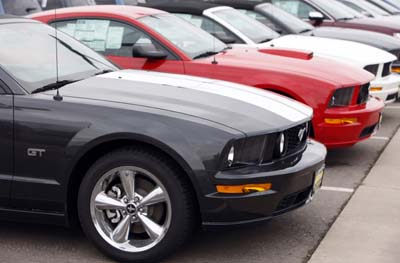
By TOM KRISHER and BREE FOWLER
DETROIT
Major automakers’ U.S. sales continued their deep slump in February, putting the industry on track for its worst sales month in more than 27 years as huge rebates and low-interest financing fail to spur fearful consumers to make a major purchase.
Ford Motor Co.’s U.S. sales fell 48 percent from a year earlier, while Toyota Motor Corp. posted a 40 percent drop, proving that massive layoffs, the stock market decline and sliding home values are prompting people to hold on to their cars longer. Those who are buying are more often opting for a used car or truck.
The slide casts further doubt on the financial viability of General Motors Corp. and Chrysler LLC, which planned to report their sales later Tuesday. They need to sell cars and generate critical cash to supplement the $17.4 billion in government loans that are keeping them in business.
Automakers and analysts have been predicting sales will rebound in the second half of this year, but they are becoming less certain.
Emily Kolinski Morris, Ford’s top economist, said retail sales to individuals had been stable for four months but dropped in February, indicating that last month may not be the bottom for auto sales.
The bottom, she told reporters and industry analysts, can’t be predicted. But she said Ford’s forecast still calls for a modest second-half recovery as economic stimulus measures takes hold.
Industry analysts say when all the numbers are tallied, February sales could be worse than January’s total of 656,976 light vehicles. That was the lowest monthly total since the industry sold 656,310 vehicles in December 1981, according to Autodata Corp. and Ward’s AutoInfoBank.
The trough is likely even though automakers spent more on rebates, low-interest financing and other incentives in an effort to bring out buyers. But despite the fantastic deals, sales continued to slump.
“If it wasn’t for the generous level of incentives now, we probably would be seeing even lower sales, if you can believe it,” said Jesse Toprak, executive director of industry analysis for the auto Web site Edmunds.com. “It seems it can’t get lower, but it could.”
Ford, which hasn’t taken any federal assistance, is preparing for sales to remain depressed. The Dearborn company said it plans to produce 425,000 vehicles in the second quarter, down 38 percent from the 685,000 it made in last year’s April-June period.
Toprak said there’s little automakers can do to spur sales, which are likely to drop for every major automaker.
“You can spend money on marketing or incentives. That’s all you can do,” he said. “Neither is having a big impact on sales. That tells us it’s really consumer confidence and the general negative state of the economy overall causing consumers to postpone making purchase decisions.”
Industrywide, the average incentive per vehicle last month rose 8 percent from January to $2,914 per vehicle sold, Edmunds said. Incentives climbed to an average of 20 percent of the sticker price of a new car, and they topped more than $10,000 on some vehicles.
But more people opted for a used car instead, indicating that those who need to buy a vehicle are spending less. Edmunds said its data show that 27 percent of people who intended to buy a new car switched to used at the dealership in February.
There is hope for a rebound, however. Rising used car prices are an indication that new car sales may be near the bottom, because more people will opt for new cars when they see they won’t save as much by buying a used vehicle.
Ford said it sold 99,060 vehicles last month, compared with the 192,248 it sold in February 2008, and the sales slump hit both ends of the company’s model lineup. Sales of the F-Series truck, traditionally the best-selling vehicle in the U.S., fell 55 percent, while sales of the Focus small car also dropped, by 39 percent.
Toyota Motor Corp.’s total of 109,583 vehicles came in slightly higher but was down from 182,169 in the same month a year ago.
The Associated Press reports unadjusted auto sales figures, calculating the percentage change in the total number of light vehicles sold in one month compared with the same month a year earlier. Some automakers report percentages adjusted for sales days. There were 24 sales days last month, one fewer than in February 2008.
AP Auto Writer Kimberly S. Johnson in Detroit contributed to this report. AP Auto Writer Bree Fowler reported from New York.








